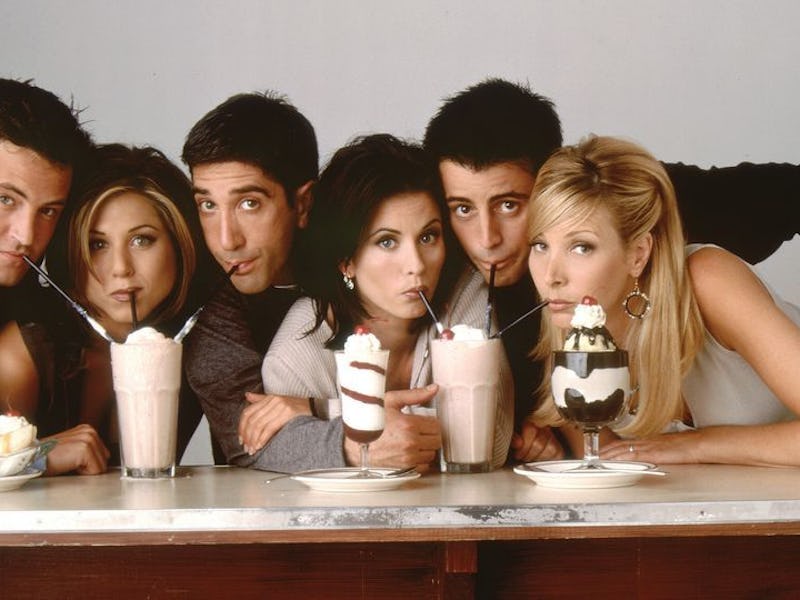Why We Need to Stop Hoping for a 'Friends' Reunion
On the matter of the 'Friends' reunion: Let. It. Go.

The nostalgia machine is relentless these days. A week doesn’t go by without the announcement of a reboot or revival. The X-Files, Full House, Twin Peaks, Gilmore Girls, the list goes on and on. The nostalgia itself is understandable — who doesn’t sometimes wish for times passed? — but the millennial generation has elevated its market value to unprecedented levels. The recognizable has become valuable. One show the public still cannot seems to get enough of is Friends.
Joey, Phoebe, Rachel, Ross, Chandler, and Monica in "The One Where Chandler Gets Caught"
Ever since Friends aired its last episode in 2004, fans have ardently been rooting for some kind of reunion — a feature film, a proper scripted TV revival, or even just getting its much-beloved cast members in a room together. Friends aired during particularly formative years for the millennial generation, 1994-2004, which, combined with the current nostalgia machine, has rekindled hopes for a reunion. The subtext is clear: “We’ll take what we can get.”
On February 21, NBC will air “A Tribute to James Burrows,” a Must See TV special, honoring the well-known TV director. According to Instagram photos taken at the taping, Courteney Cox, Jennifer Anniston, Matt LeBlanc, Lisa Kudrow, and David Schwimmer sat together. Unfortunately, Matthew Perry couldn’t make it due to his play The End of Longing, opening in London. In an interview with Graham Norton, he clarified that his absence won’t ruin the possibility of a reunion as “It’s not the Friends reunion everyone is hoping for. They’re celebrating Jim Burrows.” The internet wept.
At this point, it seems unlikely that a legitimate Friends reunion will ever see the light of day, but that’s OK. For a group of people as driven by nostalgia as our generation, let’s have Friends be our definitive lesson in letting go.
As a result of all the TV shows that have recently been revived, the public has become conditioned to having their unabated prayers answered. This inherent nostalgia begets revived shows, which begets more nostalgia, which begets more revivals, and so on. It’s a spiral that will continue as long as we keep blindly following this nostalgia that feels innocent and sweet, but actually hinders the progression of popular culture. Missing a piece of entertainment does not entitle us to getting its corpse back.
Beyond combating a spoiled breed of nostalgia, a show as beloved as Friends shouldn’t be revived due to the risk of tainting what already came to a perfect conclusion in 2004. Friends ran for 10 full seasons and neatly wrapped up each of its six characters’ respective journeys: Ross and Rachel realized that they were meant to be together; Monica and Chandler had twins and moved out of the city; and Phoebe and Mike got married. Joey was the only character whose story did not neatly tie-up, continuing in the deplorable and mercifully short-lived spinoff, Joey. The show all but reached out of the screen to tell viewers that we could also move on with our lives too — this has clearly fallen on deaf ears.
It is not surprising that we millennials have latched onto Friends with such relentless fervor. These characters were all roughly 25-26 years old when we met them, an age that many millennials are currently approaching with great apprehension. It feels comfortable to re-embrace these now-defunct characters as peers in the face of our own dreary realities. Attempts to mirror one’s life after those of the Friends, however, are futile and unrealistic. Manhattan is far too expensive, if you’re making as little money as Phoebe or Joey, and no working person has enough free time to spend this much of it in a coffee shop. There is really little to be gleaned from six white adults who spent a decade lounging and hugging. A lot to be enjoyed, undoubtedly, but not a lot to be learned — certainly nothing that is worth exhuming in 2016.
At this point in time, none of the Friends cast members have confirmed or denied that a reunion is in the works, which means that one could still happen. This, however, has much more to do with the insidious nag that nostalgia now represents on the pop culture landscape than the artistic value of a Friends reunion. Kick your nostalgia like the bad habit it is and learn to enjoy the finite.
See below for inspiration: